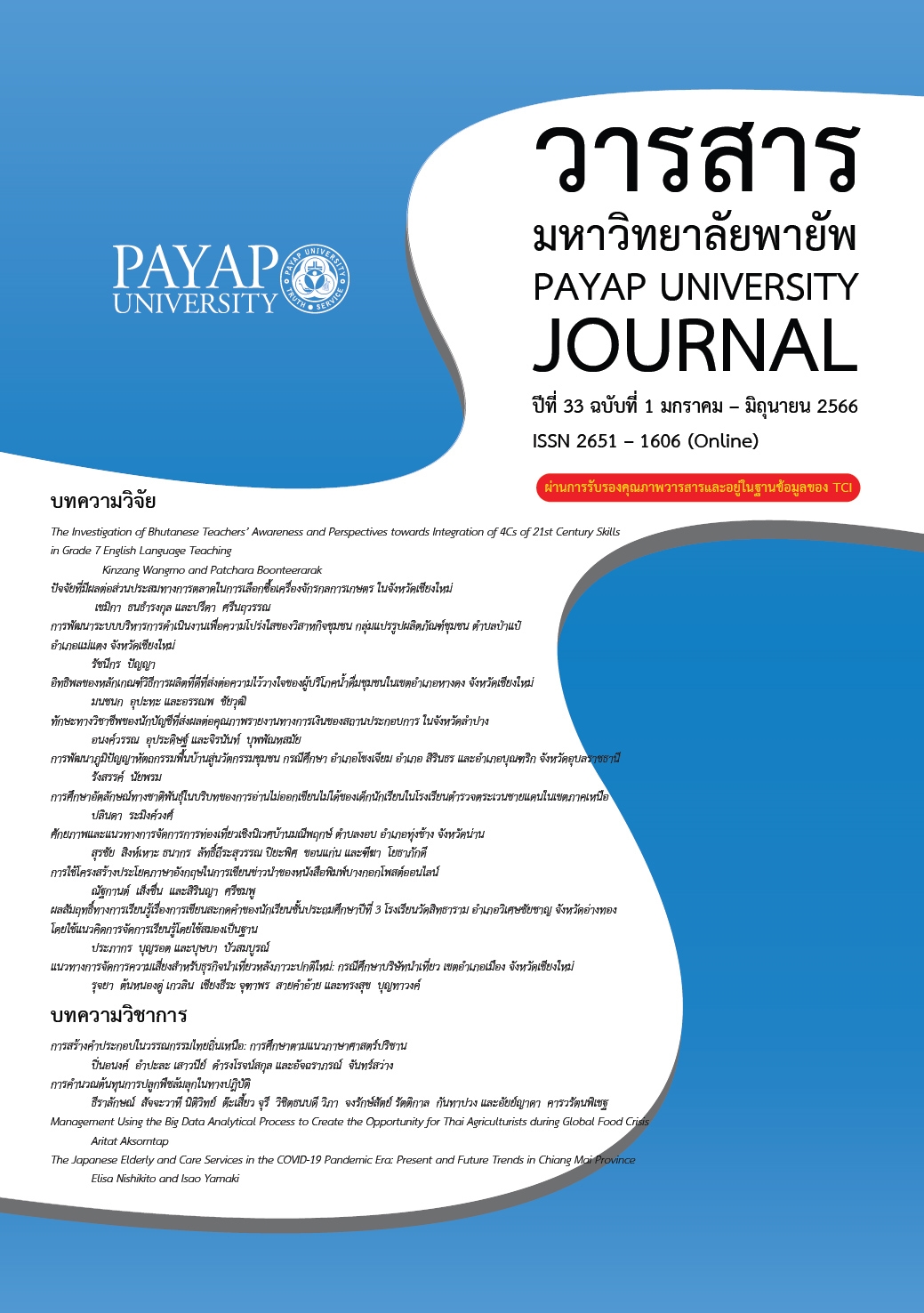ผู้สูงวัยชาวญี่ปุ่นกับงานบริบาลในระยะแพร่ระบาดของไวรัสโควิด 19 สถานการณ์ปัจจุบันและแนวโน้มอนาคตในจังหวัดเชียงใหม่
Main Article Content
บทคัดย่อ
ในช่วงเวลา 20 ปีที่ผ่านมา อุตสาหกรรมการรองรับผู้เกษียณอายุในประเทศไทยได้ลงทุนสร้าง ที่พำนักระยะยาว และสร้างระบบงานบริบาลคุณภาพสูงสำหรับผู้เกษียณอายุชาวต่างชาติ โดยมี ผู้เกษียณอายุชาวญี่ปุ่นเป็นหนึ่งในกลุ่มเป้าหมายสำคัญ เนื่องจากเป็นผู้บริโภคระดับไฮเอนด์ แต่จากปัญหาด้านการสื่อสาร ปัญหาความแตกต่างทางวัฒนธรรม และปัญหาด้านการเงิน ส่งผลให้ ผู้เกษียณอายุชาวญี่ปุ่นไม่สามารถใช้บริการสิ่งต่าง ๆ เหล่านั้นได้อย่างเต็มที่ นอกจากนั้น การระบาดของเชื้อไวรัสโควิด 19 ในปี พ.ศ. 2563 ทำให้การเดินทางระหว่างประเทศเป็นไปด้วยความยากลำบาก และก่อให้เกิดภาวะเศรษฐกิจถดถอยทั่วโลก ส่งผลกระทบต่อการท่องเที่ยวในวัยเกษียณอย่างมีนัยสำคัญ ยิ่งไปกว่านั้น การจ่ายเงินบำนาญที่น้อยลง เพดานอายุเกษียณที่สูงขึ้น เงินญี่ปุ่นที่อ่อนค่าลง และค่าครองชีพที่สูงขึ้นในประเทศไทย ยังส่งผลให้ผู้เกษียณอายุชาวญี่ปุ่นที่มีความประสงค์จะย้ายไปต่างประเทศมีจำนวนลดลง ซึ่งทำให้ความต้องการในการขอรับบริการต่าง ๆ ในประเทศผู้รับลดลง ไปด้วย สำหรับผู้เกษียณอายุชาวญี่ปุ่นที่ตัดสินใจพักอาศัยถาวรในจังหวัดเชียงใหม่ ส่วนใหญ่จะเริ่มหันไปใช้บริการดูแลสำหรับคนไทยทั่วไป ซึ่งจะมีค่าใช้จ่ายที่ถูกกว่า ปรากฏการณ์นี้ทำให้เกิดคำถามเกี่ยวกับความยั่งยืนของระบบงานบริบาลผู้สูงอายุชาวญี่ปุ่น และภาระการให้บริการที่หนักขึ้นของงานบริบาลผู้สูงอายุชาวไทย
Article Details
เอกสารอ้างอิง
Nationthailand. (2018, March 15). A Catalyst for development of senior living communities in Thailand https://www.nationthailand.com/property/30340992
AI Home Chiang Mai. (2022). AIHOMEチェンマイ. https://aihomechiangmai.net/
Asian Development Bank. (2020). Country diagnostic study on long-term care in Thailand. Author. http://dx.doi.org/10.22617/TCS200373-2
Cancer Connect Chiang Mai & Lanna Care Net. (2015). Details of surveyed senior health care facilities in Chiang Mai, Thailand. https://www.lannacarenet.org/wp-content/uploads/2015/02/Care-survey-grid-1.pdf
Representatives Election and Year-End Report. (2015, January 1). CLL Newsletter, 138, 2. https://www.cll-thaijp.net/newsletter
CLL Activity Schedule for April 2020. (2020, April 1). CLL Newsletter, 201, 8. https://www.cll-thaijp.net/newsletter
Monthly Report. (2022, June 1). CLL Newsletter, 227, 2. https://www.cll-thaijp.net/newsletter
Future Japanese pension benefits to drop to half of workers’ take-home pay. (2019, September 11). Nippon.com. https://www.nippon.com/en/japan-data/h00533/future-japanese-pension-benefits-to-drop-to-half-of-workers%E2%80%99-take-home-pay.html
Health and Global Policy Institute. (2015). Japan Health Policy Now. http://japanhpn.org/en/section-3-1/
Kaendera, S. & Leigh, L. (2021, June 23). Five things to know about Thailand’s economy and COVID-19. INTERNATIONAL MONETARY FUND. https://www.imf.org/en/News/Articles/2021/06/21/na062121-5-things-to-know-about-thailands-economy-and-covid-19
Kuroda, A. (2015). The present situation and problems of the domestic long stay: Domestic long stay facilities in Japan. The Bulletin of Kurashiki University of Science and the Arts, 21, 141-154. http://id.nii.ac.jp/1239/00000304/
Leng, C.H. (2007). Medical tourism in Malaysia: International movement of healthcare consumers and the commodification of healthcare. Asia Research Institute Working Paper Series, 83, 3-32. http://ssrn.com/abstract=1317163
Liemsuan, T., Boonyoung, K., Arthornturasook, P. & Ogawa, S. (2022). Japanese clustering and needs of Japanese towards long - stay tourism in Thailand. Jsn Journal, 12(1), 82-106. https://so04.tci-thaijo.org/index.php/jsn
Malaysia My Second Home. (2021). New rules 2021. https://www.mm2h.com/new-rules-2021/
Martin, A.K.T. (2022, October 17). Work forever: Japan’s seniors brace for life without retirement. The Japan Times. https://www.japantimes.co.jp/news/2022/10/17/business/senior-employment-japan/
Ministry of Foreign Affairs of Japan. (n.d.). Japan is looking for specified skilled workers. https://www.mofa.go.jp/mofaj/ca/fna/ssw/us/index.html
Ministry of Foreign Affairs of Japan. (2021). Annual Report of Statistics on Japanese National Overseas. https://www.mofa.go.jp/mofaj/toko/tokei/hojin/index.html
Ministry of Foreign Affairs, Kingdom of Thailand. (2022). Non - immigrant visa “O-A” (Long Stay). https://www.mfa.go.th/en/page/non-immigrant-visa-o-a?menu=5e1ff71bc4281a00c812e8e2
Miyashita, Y., Akaleephan, C., Asgari-Jirhandeh, N. & Sungyuth, C. (2017). Cross - border movement of older patients: A descriptive study on health service use of Japanese retirees in Thailand. Globalization and Health, 13(14), 1-11. DOI 10.1186/s12992-017-0241-9.
Morikawa, M. (2014). Towards community-based integrated care: Trends and issues in Japan’s long-term care policy. International Journal of Integrated Care, 14, 1-10. https://www.ijic.org/article/10.5334/ijic.1066/
Nishikito, E. (2020a). The Impacts of aging japanese long - stayers on health care services in Chiang Mai. Payap University.
Nishikito, E. (2020b). The current situation of aging Japanese retirees and their impacts on medical services in Chiang Mai province, Thailand. Jsn Journal, 10(2), 100-118. https://doi.org/10.14456/jsnjournal.2020.13
Ono, M. (2012). Searching for care: International retirement migration and medical tourism in Malaysia among elderly Japanese. Journal of Asia - Pacific Studies, 18, 253-267. http://hdl.handle.net/2065/36016
Phoenix Capital Group. (2022, May 7). Currency war between Thailand and Japan: Yen vs. Baht. https://www.thephoenixcapitalgroup.com/currency-war-between-thailand-and-japan-yen-vs-baht/
Sugimura, T. (2021, December 22). Statistics of the Ministry of Justice: Unraveling the current situation of “Specified Skilled Workers” from the number of foreign residents under the “Specified Skilled Worker” status of residence. [Homushõ tõkei “Tokutei Ginõ Zairyũ Gaikokujin-sũ kara himotoku “Tokutei Ginõ” no Genjõ]. Global HR Magazine: Diversity & Inclusion. https://global-hr.lift-group.co.jp/132
The Japan Times Editorial Board. (2022, October 21). An ever weakening Yen punishes thenNation. thejapantimes. https://www.japantimes.co.jp/ opinion/2022/10/21/editorials/yen-depreciation/
Toyota, M. & Xiang, B. (2012). The emerging transitional "retirement industry" in Southeast Asia, International Journal of Sociology and Social Policy, 32 (11), 708 – 719. http://dx.doi.org/10.1108/01443331211280737
Wogmonta, S. (2021). Post-COVID 19 tourism recovery and resilience: Thailand context, International Journal of Interdisciplinary in Management and Tourism, 5(2), 137 – 148. https://doi.org/10.14456/ijmmt.2021.12
Wongboonsin, P., Aungsuroch, Y. & Hatsukano, N. (2020). The ageing society and human resources to care for the elderly in Thailand. In Tsujita, Y. and O. Komazawa (Eds.), Human resources for the health and long-term care of older persons in Asia (pp.104-135). Jakarta: ERIA.
Yamagishi, H. (2019). Chiang Mai, the final destination [Chenmai Saishyu Eki]. Society for the Care and Support in Chiang Mai.
Yamaki, I. (2020). The quality of life of elderly Japanese residents of Chiang Mai: A case study of members of Japanese Associations in Chiang Mai. e-Bangi Journal of Social Sciences and Humanities, 17(1), 175-187. https://ejournals.ukm.my/ebangi/article/view/37506


